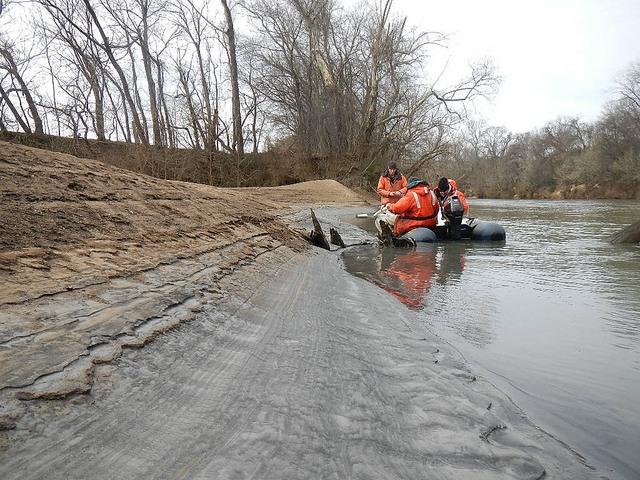
If new guidelines issued Wednesday go through, Duke Energy will have eight more years to clean up coal ash deposits in North Carolina. The proposed framework sets prioritized deadlines for Duke Energy to clean up more than 30 coal ash sites that serve as depositories for the company's lingering coal-fired plants.
Under the proposed guidelines, Duke Energy will have until 2019 to remove and close down toxic coal ash deposits at eight sites deemed "high priority" across the state, ruled North Carolina's Department of Environmental Quality. They include two deposits on the Dan River, the site of a 39,000-ton coal ash spill in 2014.
The company would have until 2024 to clean up the remainder of its 33 ash deposits, all of which have been rated as "intermediate priority." Under the state's Coal Ash Management Act of 2014, the company was ordered to phase out the use of such deposit sites, which are considered responsible for the pollution of rivers and streams in the state, and the new guidelines acknowledge that obligation.
But according to Waterkeeper Alliance and the Sierra Club, the proposed guidelines don't address the urgency of the problem. They can also be modified at a future date, a condition that was requested by Gov. Pat McCrory's office and allows for the proposed guidelines to be reviewed in 18 months.
The McCrory administration suggested that the time-frame may be too stringent for the company to complete, as Duke estimated that it may cost as much as $10 billion. Closing out the antiquated deposit sites requires Duke Energy to dig up the coal ash and deposit it in lined landfills away from key water sources.
"The deadlines in the coal ash law are too compressed to allow adequate repairs to be completed,” said Donald R. van der Vaart, secretary to the state's Department of Environment and Natural Resources.
But Waterkeeper Alliance attorney Pete Harrison said that the new guidelines, and the ability of the state to change them at will in a couple of years, indicate the McCrory administration's unwillingness to take the environmental risks seriously and force Duke Energy to clean up the coal ash.
"[The McCrory] administration is making a mockery of the law and continuing to cower away from taking one iota of meaningful action to clean up leaking coal ash dumps," Harrison said in a statement last Wednesday. "To this day, McCrory’s DEQ has not required Duke Energy to clean up one ounce of coal ash anywhere in the state.”
McCrory's administration is no stranger to criticism when it comes to its stance on Duke Energy's coal ash problem. The environmental lobby has long accused McCrory, a former employee of Duke Energy, of taking steps that benefit the energy company. These same actions, critics say, also help to weaken environmental protections by restricting the actions of the state's environmental regulators. In 2014, following the Dan River spill, the DENR and Duke Energy became the focus of a federal investigation.
While the governor's office maintains impartiality when it comes to regulatory investigations of Duke Energy's coal-fired plants, recent investigations by media and environmental organizations offered some troubling questions about the regulation of the state's largest power company.
In June 2015, as the U.S. Environmental Protection Agency was closing out its monitoring of the Dan River following the coal ash spill, McCrory met for dinner with Duke Energy officials at the state mansion, reports North Carolina-based WRAL News. The governor's office and DENR declined to discuss details of the meeting other than to say that it related to the "economy, the environment, energy and job creation."
But a deposition of the state's former epidemiologist rekindled concerns about how the company's coal ash is being managed, and the priorities that are being set at the state level. According to a statement from epidemiologist Megan Davies taken under oath, efforts to advise residents near to coal ash deposits not to drink water from their wells was rescinded by the McCrory administration much too soon.
State law required the Department of Health and Human Services to monitor wells for contaminants related to the spill, which her office did. Residents were issued "do not drink" advisories in 2015. In March 2016, the advisory was cancelled, even though the spill was still being monitored for the carcinogen hexavalent chromium, which has the potential to leach into water systems from unlined coal ash deposits.
Davies' deposition asserts that the change in policy followed a high-level meeting in June 2015 concerning the "do not drink" notices in which Secretary van der Vaart and Duke Energy attorneys were both present.
McCrory's office and North Carolina Department of Health and Human Services officials are also under federal investigation related to hiring and contract practices that investigators say may violated federal law.
Flickr/USFWS
Jan Lee is a former news editor and award-winning editorial writer whose non-fiction and fiction have been published in the U.S., Canada, Mexico, the U.K. and Australia. Her articles and posts can be found on TriplePundit, JustMeans, and her blog, The Multicultural Jew, as well as other publications. She currently splits her residence between the city of Vancouver, British Columbia and the rural farmlands of Idaho.














